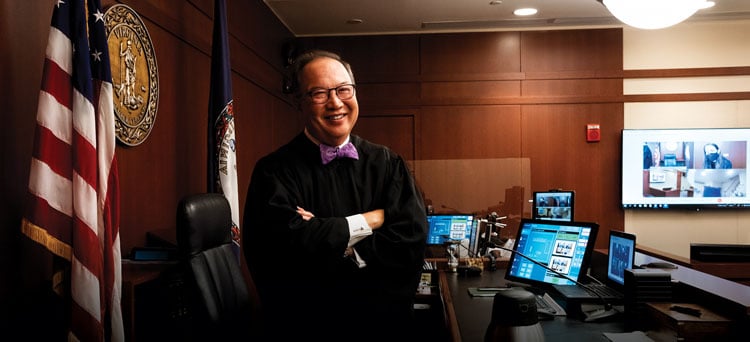
Photo of Judge John Tran by David Hills Photography/ABA Journal
If you need a judge who can be counted on to research all courtroom technology offerings that can help proceedings continue during the COVID-19 pandemic, look no further than John Tran of the Fairfax County Circuit Court in Virginia.
After the Virginia Supreme Court issued an order June 22 stating that remote proceedings should be used to conduct as much business as possible, Tran offered webinars to help lawyers with the Fairfax Bar Association get up to speed with Webex, the platform the court uses for remote proceedings.
“When Webex has a news release, he’s all over that. He’s already had a private demo. He is one of a small number of exceptionally tech-savvy judges,” says Sharon Nelson, a Fairfax attorney and co-founder and president of the digital forensics firm Sensei Enterprises.
Courts can devote a significant amount of time to finding technology for remote hearings during the COVID-19 pandemic, but the action is useless if lawyers can’t or won’t use it, Tran says.
“At first, I didn’t think too many people would be wanting to do it; time is money for lawyers,” adds Tran, 61. However, the webinars got a big turnout. “The people who wanted to participate, I could look at their names and see they are regular courthouse lawyers who were there every day.”
Some Fairfax County litigators may prefer in-person hearings to remote appearances, but they appreciate the technology because it allows them to keep billing rather than have all work postponed due to COVID-19, Nelson says.
She describes Tran, whom she’s known for some time, as someone who is patient with lawyers and litigants and offers help without sounding condescending. “He loves things that make the courtroom work better. Some of the judges are not as familiar with technology. Some pick it up really well, but they don’t love it. He loves it,” Nelson says.
Tran, who was born in Vietnam, is a former assistant commonwealth’s attorney for the city of Alexandria and a former special assistant U.S. attorney for the Eastern District of Virginia. His father was a South Vietnamese diplomat, and the family went back and forth between Vietnam and the United States until 1975, when Saigon fell.
In 2013, the Virginia General Assembly elected him as a judge, and he is the state’s first Vietnamese American judge. As the son of a diplomat, Tran says he was always interested in the rule of law. Also, he was inspired by one of his undergraduate professors at George Washington University who had a JD and a psychology degree. Tran also attended law school at George Washington, graduating in 1984. “I was led to believe that being a lawyer required constant imagination and thinking,” he says.
That seems particularly true during the pandemic. Tran generally opens court meetings early so people can test their equipment. Sometimes, parties might need an Ethernet cable to plug a laptop into a router because Webex may not work on a Wi-Fi connection. If litigants have trouble using the platform, “we do work-arounds,” Tran says. However, Tran says he’s also had people use Webex with cellphones. That’s usually for a shorter hearing, he adds, because they can’t see documents.
For Tran, there are some things about remote hearings he prefers. Like when the parties submit a joint motion for a court order. “They used to go out in the hallway and write up an order. Some of their handwriting was really terrible,” he says. “Now, they type it up and email it to my clerk, and I would print it out and sign it.”
He also finds remote hearings less distracting than in-person court calls. “I can focus on them. And so far, the lawyers who have appeared remotely have been more concise in presenting their arguments. They don’t seem to be distracted. In the past, everybody with motions to argue would be in the courtroom. Our Friday motions docket was so crowded that lawyers would sit in the jury box, and go in and out,” he says.
Read more: 2021 Legal Rebels: Meet 10 legal professionals who are courting change